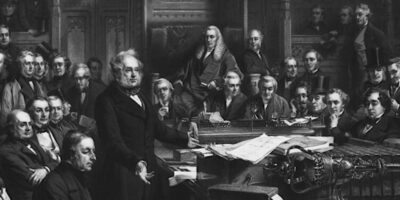The Long Life of the Mercantile State
I was digging through the archives of the American Institute for Economic Research and ran across a speech by founder EC Harwood from the early 1940s. He opened by recalling the circumstances surrounding the passage of the disastrous Smoot-Hawley tariff of 1930, an act that turned a predicted (and predictable) stock market correction into a macroeconomic depression. (AIER was founded in 1933 to oppose government intervention.)
Harwood pointed out that more than one thousand economists signed a letter denouncing the tariffs and calling for free trade. It might have been the largest and most organized effort by economists to weigh in on a government policy until that point in history. Looking more deeply, there is a substantial body of research recalling the circumstances behind this tariff and celebrating the opposing forces. It is a case study of how expediency triumphs over rationality and thereby produces social and economic ruin.
Principled Economists
The letter that came from the economists was very inspiring:
“We are convinced that increased protective duties would be a mistake. They would operate, in general, to increase the prices which domestic consumers would have to pay. By raising prices they would encourage concerns with higher costs to undertake production, thus compelling the consumer to subsidize waste and inefficiency in industry. At the same time, they would force him to pay higher rates of profit to established firms which enjoyed lower production costs. A higher level of protection, such as is contemplated by both the House and Senate bills, would therefore raise the cost of living and injure the great majority of our citizens.. We would urge our Government to consider the bitterness which a policy of higher tariffs would inevitably inject into our international relations…. A tariff war does not furnish good soil for the growth of world peace.”
Economist Frank Fetter recalled what a striking moment it was. “Economic faculties that within a few years were to be split wide open on monetary policy, deficit finance, and the problem of big business,” he said, “were practically at one in their belief that the Hawley-Smoot bill was an iniquitous piece of legislation.”
President Hoover ignored the letter, as well as the pleas of top bankers and corporate executives. He signed the law that made a bad situation worse and kicked off a global trade war that no one won. Paul H. Douglas, the primary author of the letter, later recalled “I think poor Hoover wanted to take our advice. His party was so strongly committed to protection, however, that he felt compelled to sign the bill, with the result that all our predictions came true.”
To be sure, Hoover was under the sway of some small sectors of industry that benefited from trade. More pressingly, he was just trying to do something to patch things up and there is something about the idea of protectionism that appeals to a person assigned to be in charge of the nation state. It’s a strange intuition that emanates from people in charge: keep the foreign products out and let’s make everything here at home. No matter how often the plan fails, it keeps coming back again. The economists still object but somehow the chief executive hunts down the one economist who is willing to say what the executive wants him to say.
Unprincipled Economists
In this case of Donald Trump’s tariffs, he found Peter Navarro as the economist who was willing to consecrate bad policy as holy and good. We know from testimony from people there at the time that Navarro became the man because someone on the staff searched Amazon books for some economist who was worried about China. The book “Death by China” caught the president’s eye, and the rest is history.
For his own part, Navarro shares none of the president’s interests in tax cuts and deregulation. He is a registered Democrat who opposes fossil fuels and favors product bans in the name of environmentalism. He is also an isolationist and protectionist (not unlike Bernie Sanders). None of which is surprising. Trump cannot claim to “drain the swamp” while filling the swamp back up with the torrent of trade lobbyists who are now begging the powers that be for some form of exemption.
The general goal of free trade as a guarantor of peace and prosperity has been one of the few consensus points of politics that has been consistent since the end of World War Two. Now, we suddenly find that we can no longer take this for granted, not when the President of the US is tweeting that he would love to start a trade war.
And thus does the world now find itself embroiled in the chaotic politics of protectionism, complete with panicked lobbying, retaliation threats, and shock and awe from anyone who posses even the slightest knowledge of the history of mercantilism.
The rumblings are all around us. A new kind of uncertainty has come to the world: discretion is displacing the rule of law in international trade. Europe has produced a full list of American products it plans to target for retaliation. Basically, it is all the stuff that Americans are known for: trucks, blue jeans, corn, makeup, tobacco, and bourbon. You can browse the entire list of products that could soon find themselves unwelcome in the Old World, at least not at market prices.
Think about the implications of this trade war: American consumers and producers pay higher prices for millions of products and then American producers are blocked from access to markets abroad, and the retaliation starts again. Oh, what a beautiful war. What does it achieve? Nothing desirable from the point of view of the common person on either side of the border.
All mercantilism relies on a fundamental fallacy that confuses wealth with money and thus attempts to keep as much paper (or gold or whatever) as possible in the country. The mistake is the failure to realize that wealth takes many forms, including goods and services; money is only there to facilitate trade, which is the real source of rising prosperity. The particulars of the political geography of that trade matters not at all from an economic perspective.
State Building
By coincidence, I’m watching the second season of a wonderful show on Netflix called Versailles. It tells the story of the reign of Louis XIV in France, the Sun King, and his incredible imperial ambitions. The show revolves around life at the palace, which the King (who believed that he ruled by Divine Right) constructed to ingather nobles from all over France so that he could watch and pacify them, disarming them as potential threats to state power.
The show was conceived before President Trump was a reality but somehow it all rings familiar in our time, down to the Sun King’s treatment of subordinates, his incurable paranoia, his insatiable desire for more power, and even his war on drugs and leakers in the palace. Staffing changes at the palace are driven by one consideration: loyalty to the King.
The show doesn’t focus on Louis’s mercantilism but you can pick up hints of it. The real history has Louis finding at least one economist in France he could rely on to feed his fear of imports, which he dreaded because he believed imports meant gold outflows and thus impoverishment. His name was Jean-Baptiste Colbert (1619-1683) who served as the French minister of finance. His litany of preferred policies sounds like it comes from today’s White House: high spending on infrastructure, high tariff walls, an imperialist push for exports, and the creation of industrial guilds.
Colbert ended up presiding over economic stagnation of the country even as the palace and the royals lived ever more opulently. Colbert was no socialist. He is more properly considered to be a proto-fascist because his views on economics were exactly what we came to expect from mid 19th-century advocates of protectionism, industrial control, and centralized statism – an ideology that grew like cancer for a century until culminating in the interwar period in Europe. The goal of such an outlook on political economy is not prosperity as such much less freedom for all. The goal of the mercantilist state is the celebration, enrichment, wealth, and glory of the head of state.
The object of Colbert’s service was the Sun King but the experience proves the rule that there is nothing new under the sun. Every departure from liberalism is a push for one or another form of centralized statism. The goal of feeding the power of the chief executive is always the core motivation of all forms of mercantilism, whether in the 17th century, the interwar years, or our own times.












